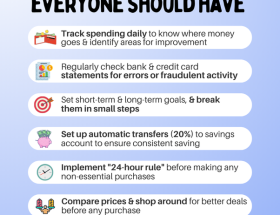In today’s fast-paced world, managing personal finances can be a daunting task. With so many expenses to keep track of and financial goals to meet, it’s easy to feel overwhelmed. However, with the right tools and strategies, you can take control of your finances and achieve your financial goals. In this ultimate guide, we’ll explore some tips and techniques to help you effectively manage your personal finances.
Set Financial Goals
The first step in effectively managing your personal finances is to set clear financial goals. Whether you want to buy a new car, save for retirement, or pay off debt, having specific goals in mind will help you stay focused and motivated. Make sure your goals are realistic and achievable, and set a timeline for achieving them. This will give you a clear roadmap to follow and help you track your progress.
Create a Budget
Creating a budget is essential for managing your personal finances. Start by tracking your income and expenses to get a clear picture of where your money is going. Then, categorize your expenses into essential (such as rent, groceries, and utilities) and non-essential (such as dining out and entertainment). This will help you identify areas where you can cut back and save money. Make sure to review your budget regularly and make adjustments as needed.
Save and Invest Wisely
Saving and investing are key components of managing your personal finances. Set aside a portion of your income each month for savings, emergency funds, and retirement accounts. Consider automating your savings by setting up automatic transfers from your checking account to your savings account. When it comes to investing, do your research and consider working with a financial advisor to help you make informed decisions.
Manage Debt Effectively
Debt can be a major obstacle to achieving your financial goals. Manage your debt effectively by prioritizing high-interest debt and making more than the minimum payments each month. Consider consolidating your debt or negotiating with creditors to lower interest rates. Avoid taking on new debt unless absolutely necessary, and focus on paying off existing debt as quickly as possible.
Track Your Progress
Tracking your progress is essential for managing your personal finances. Regularly review your budget, savings accounts, and investments to ensure you are on track to meet your financial goals. Use personal finance apps and tools to help you stay organized and monitor your progress. Celebrate your achievements along the way to stay motivated and continue working towards your goals.
Seek Professional Help
If managing your personal finances feels overwhelming, don’t be afraid to seek professional help. Consider working with a financial advisor or accountant to help you create a personalized financial plan and guide you towards achieving your goals. They can provide valuable insight and expertise to help you make smart financial decisions and stay on track.
In conclusion, managing your personal finances effectively requires discipline, planning, and dedication. By setting clear financial goals, creating a budget, saving and investing wisely, managing debt effectively, tracking your progress, and seeking professional help when needed, you can take control of your finances and achieve your financial goals. With the right tools and strategies, you can build a secure financial future for yourself and your loved ones.









